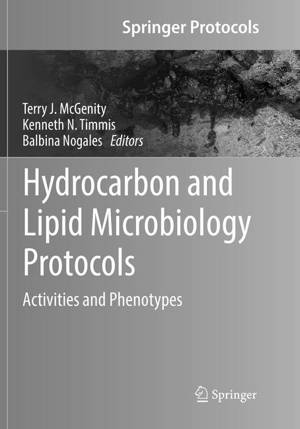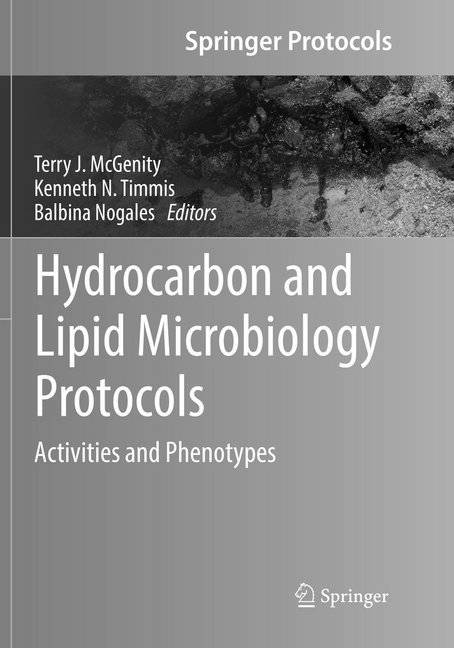
- Afhalen na 1 uur in een winkel met voorraad
- Gratis thuislevering in België vanaf € 30
- Ruim aanbod met 7 miljoen producten
- Afhalen na 1 uur in een winkel met voorraad
- Gratis thuislevering in België vanaf € 30
- Ruim aanbod met 7 miljoen producten
Zoeken
Hydrocarbon and Lipid Microbiology Protocols
Activities and Phenotypes
€ 106,95
+ 213 punten
Omschrijving
This Volume features protocols for investigating the hydrocarbon- and lipid-specific activities of microbes. They include methods for studying chemotaxis, the colonisation of hydrocarbon surfaces, hydrocarbon uptake, respiration, nitrogen fixation, sulphate reduction, membrane stabilisation through cis-trans isomerisation of membrane fatty acids, and the production of biosurfactants and biopolymers in response to the presence of hydrocarbons. A protocol for studying the ability of microbes to control the concentration of hydrocarbons in their aqueous environment is also described, and phenotyping methods to reveal microbes' more general metabolic activities are presented. Several protocols for investigating acid production in connection with oil souring and biocorrosion by microbes in oil well, oil transportation and storage settings are presented. Lastly, protocols for measuring methanogenesis, as an example of microbial hydrocarbon production, are described.Hydrocarbon and Lipid Microbiology ProtocolsThere are tens of thousands of structurally different hydrocarbons, hydrocarbon derivatives and lipids, and a wide array of these molecules are required for cells to function. The global hydrocarbon cycle, which is largely driven by microorganisms, has a major impact on our environment and climate. Microbes are responsible for cleaning up the environmental pollution caused by the exploitation of hydrocarbon reservoirs and will also be pivotal in reducing our reliance on fossil fuels by providing biofuels, plastics and industrial chemicals. Gaining an understanding of the relevant functions of the wide range of microbes that produce, consume and modify hydrocarbons and related compounds will be key to responding to these challenges. This comprehensive collection of current and emerging protocols will facilitate acquisition of this understanding and exploitation of useful activities of such microbes.
Specificaties
Betrokkenen
- Uitgeverij:
Inhoud
- Aantal bladzijden:
- 244
- Taal:
- Engels
- Reeks:
Eigenschappen
- Productcode (EAN):
- 9783662569856
- Verschijningsdatum:
- 5/07/2018
- Uitvoering:
- Paperback
- Formaat:
- Trade paperback (VS)
- Afmetingen:
- 178 mm x 254 mm
- Gewicht:
- 449 g

Alleen bij Standaard Boekhandel
+ 213 punten op je klantenkaart van Standaard Boekhandel
Beoordelingen
We publiceren alleen reviews die voldoen aan de voorwaarden voor reviews. Bekijk onze voorwaarden voor reviews.







